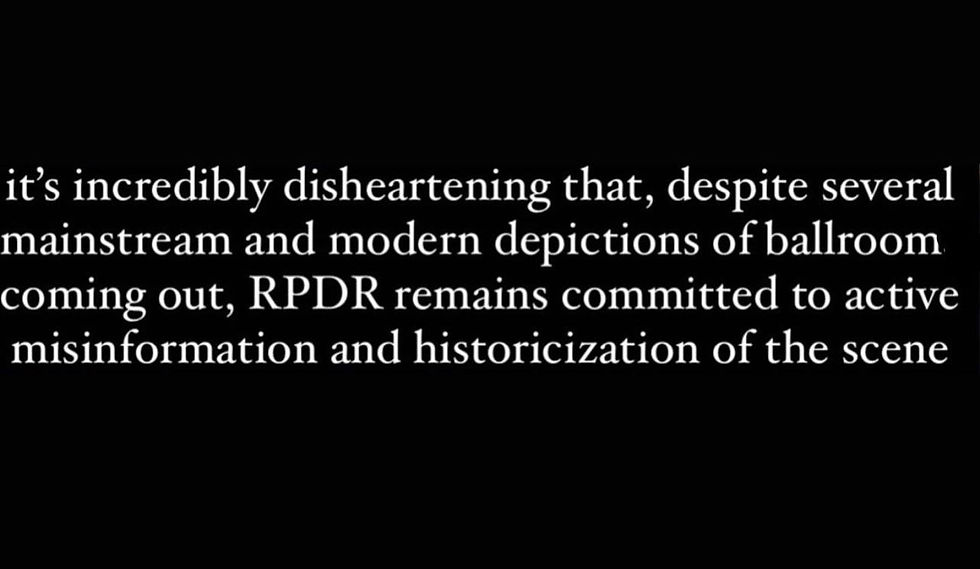
Throughout the fifteen seasons Drag Race has existed, the show has always found ways to incpororate voguing challenges into the show.
Over the years Ballroom purists have taken to social media to drag the show for referring to a dip as a death drop and shablam (the've also called out former Drag Race judge Todrick Hall on bastardizing the culture in his music videos).
During the season 15 episode 11 mini challenge Gravity Jacobs Balmain, who appeared on the first season of Legendary called out the show for mocking the culture instead of celebrating it, as they claimed.
For those who need a reminder, voguing is a highly stylized, modern house dance originating in the late 1980s that evolved out of the Harlem ballroom scene of the 1960s. It gained mainstream exposure when it was featured in Madonna's song and video "Vogue" (1990), and showcased in the 1990 documentary Paris Is Burning (which went on to win the Grand Jury Prize at the 1991 Sundance Film Festival). In its modern form, this dance has become a global phenomenon that continues to evolve both stylistically and demographically.
“Call me a hater all you want but the ‘voguing’ mini challenge in tomorrow’s [Drag Race] episode is probably the most egregious and blatant example of the show’s unrelenting efforts to bastardise and make a mockery of vogue and ballroom, from terminology to technique and framing,” Jacobs wrote.

He also called the mini-challenge “incredibly disheartening”, and said that the segment proved that Drag Race “remains committed to active misinformation and historicisation of the scene”.


He added: “Drag Race capitalising off inaccurate narratives of vogue and ballroom is nothing new, but this one is about as blatant as they come.”
He wasn't the only one who expressed his disappointment with the challenge. Drag Race alum Aja (season 9 and All Stars 3) who is part of the House of LaBeija, and also appeared on Legendary has been very vocal about the 'noguing' seen on the show and gave her thoughts in the comments.

Aja is referring to being dragged by Drag Race fans for being overly critical of fan favorite Anetra's duck walk, dips and hand movements.
Back in January when Anetra won the first maxi challenge of the season with a Variety Show performance that included duck-walking, former Legendary judge Leiomy Maldonado weighed in on the show and the queens 'noguing' skills.
Maldonado also retweeted a previous PSA she once shared on Twitter about the differences between "virgin vogue" and "noguing." The Legendary star explained:
"There's def a huge diff between 'virgin vogue' n 'Noguing.' Virgin vogue means you're studying videos/attending classes to learn from voguers. Noguing is more so someone seeing vogue and just imitating and displaying voguing however they feel it is because they're 'dancers.'"
Fans of the show took to social media to express their opinion on the matter.
“I just don’t get why ballroom folk haven’t been invited as guest judges and special guest? Like you take their s*** and then don’t wanna ki with them,” one Instagram user wrote.
Another added: “The whole thing felt extremely ridiculous and now even more people will just use vogue as a comedy gag in performances ugh.”
On the other hand, one Instagram user simply commented: “Totally disagree … RPDR is a show for the LGBT+ community and I believe that everyone has the right to do voguing even if they are not professional dancers.”
Here's my thoughts on the subject. On one hand I totally get the voguing purists like Aja, Gravity and Leiomy for criticizing the mainstream industry watering down the art of vogue for mainstream consumption.
Unfortunately this is the price you pay the moment our culture is ushered into the mainstream and performed by people who haven't studied the craft.
I just wish that Ru and producers of the show would invite people from ballroom on Drag Race and incorporate them into the challenges, because with bigoted politicians trying to erase queer history, it would behoove them to find ways to educate those who aren't aware of the culture, instead of bastardizing the art form at the behest of straight viewership.
Comments